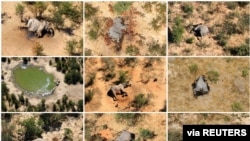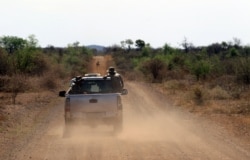Botswana has decided to re-arm its wildlife rangers as the southern African country battles increased cases of poaching. In the last six months, at least 17 poachers have been killed in gunfire exchanges with the army.
The government had disarmed wildlife rangers in 2018, saying that under the law, only the military was allowed the use of firearms during anti-poaching patrols.
With the country losing 56 rhinoceros to poachers in the last two years, the government is reconsidering that approach.
Wildlife and Tourism Minister Philda Kereng recently told parliament the government is amending the law that prevented the rangers from carrying weapons.
National Assembly legislator Kgoborego Nkawana introduced a debate in parliament over the need to re-arm the officers.
“This unit has for many years looked after the wildlife of Botswana and the endangered species, such as rhinos were properly looked after, adequately. Since the disarmament, the population has gone down, and the poaching, gone up,” said Nkawana.
Nkawana argued that legislation already gives rangers the right to use firearms.
"The law provides for wildlife personnel to carry arms where necessary. This empowers the director of wildlife and national parks to determine when they need such arms and to use where," he said.
Former Rhino Conservation Botswana director Map Ives welcomes moves to re-arm the anti-poaching officers.
“I have long said the re-arming of the DWNP is a very good thing. Remember these guys are armed, not only against poachers but also against wild animals they encounter during the course of their duties. I also believe that the fight against poaching should not be a military fight. It is a criminal fight,” said Ives.
He said to battle poachers, Botswana also needs assistance with intelligence information from neighboring countries.
“The international intelligence networks need to come to play here. These are criminal enterprises, these are not terrorists, and these are not enemy soldiers. They are criminals,” he said.
Botswana has started dehorning rhinos and moving them to new locations in a bid to fend off poachers.






